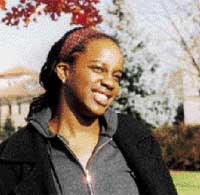

|
|
Around |
||
|
Promises
Kept
Ssensalo, 18, made it here for the same reasons as her new classmates: hard work, high scores, and swooning recommendations. She can afford it for a unique reason: When Nansamba was 6 years old, Merrill Lynch promised 25 first-graders at her 74th Street Elementary School a full college scholarship for graduating from high school on time. They made the same promise to randomly selected classes in nine other big-city schools. "I
don't remember much,"Ssensalo said. "I had to sign a contract in
the first grade. There was a big event in the auditorium. They gave
us gifts, a little pencil and eraser. I didn't understand what it
meant."
Ninety-three
percent of the 250 original inner-city first-graders started college
in the fall. Ssensalo said the magnitude of the Merrill Lynch
philanthropy hit her when she and other ScholarshipBuilder students
flew north in October of 1999 for a spate of campus tours. She
spent three days in Oberlin, which became her first choice.
"The
atmosphere here, all the trees, the burgundy--you don't get
fall in L.A.--well, I really liked the atmosphere," she said
over black coffee at the Java Zone. "It wasn't a big city. It
wasn't noisy. It was friendly, with benches and green."
The
sight of students pedaling bicycles to class amazed her. "I'm
kind of paranoid to ride in the street," Ssensalo said. "That's
nothing we'd do at home. I'm thinking about it."
Ssensalo,
who likes Skittles and Yo-Yo Ma, intends to major in chemistry
and music education. She has a wry sense of humor. Asked to
write the standard "why do you want to come to Oberlin" essay,
she riffed on the fall colors matching the college stationary.
"She
is wonderful," said Diane A. Marshall, college counselor at
Alexander Hamilton High School. "She's very warm, very talented,
and moved beautifully through our multiracial, multiethnic school.
She is also very, very astute for a girl her age."
The
willowy Ssensalo, the youngest of three children of two teachers,
is aware that Americans cherish the idea that education is a
huge engine of meritocracy, that the diligent and able will
get to the top. She doesn't buy it. "People find so many weird
ways to get advantages," she said. "There is the whole issue
of who you know and, of course, the money thing. Who can afford
$5,000 to take the Princeton Review for the SAT? You see the
same thing in the arts. Can you afford a private teacher? Do
you study with the old lady at the end of the street who played
a little a long time ago or do you take $100 per half-hour sessions
with someone from the L.A. Phil? The ones with the expensive
lessons also get the advice on how to go to Juilliard."
MUSIC
MATTERS
Ssensalo plays viola and flute. Her mother, Donna A. Edwards-Brown,
said Merrill Lynch paid for a pricey summer camp for students gifted
in strings when Nansamba was 16. "That made a big difference," Edwards-Brown
recalled. "It was an international program, with a lot of students
from Asia, and Nansamba did well. All her life, she hasn't been
afraid to try new things."
Ssensalo
brought her instruments north, joined Oberlin Community Strings,
and has found practice space in the conservatory. Her roommate,
Elizabeth Mier, came here to study harp. "It's really nice having
a roommate you can get along with, especially one who is into classical
music," said Mier, 18, of Lexington, Kentucky. The pair share a
passion for Ma's Bach Suite recordings and were trying to figure
out how to find a ride to Cleveland to see him perform at Severance
Hall.
FAMILY SUPPORT
Ssensalo, who daily arose to catch a series of city buses to her
magnet high school--the first one left at 6:45 a.m.--required
much less help than many students in ScholarshipBuilders.
Merrill
Lynch estimates it has spent $16 million on the program. Early
on, it hired full-time coordinators in all ten cities as tracking
students became difficult and family chaos threatened to overwhelm
some.
These
ten adults filled in at parent-teacher meetings, arranged school
transportation, and after-school access to computers. In some
cases, they found jobs for parents and tutoring for siblings.
A girl in Detroit got cab vouchers to school when she was bounced
among foster homes. A New York student got child care after
she gave birth to twins, and will continue to receive it through
college.
|
||
